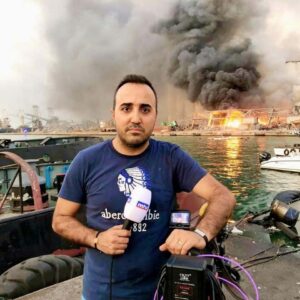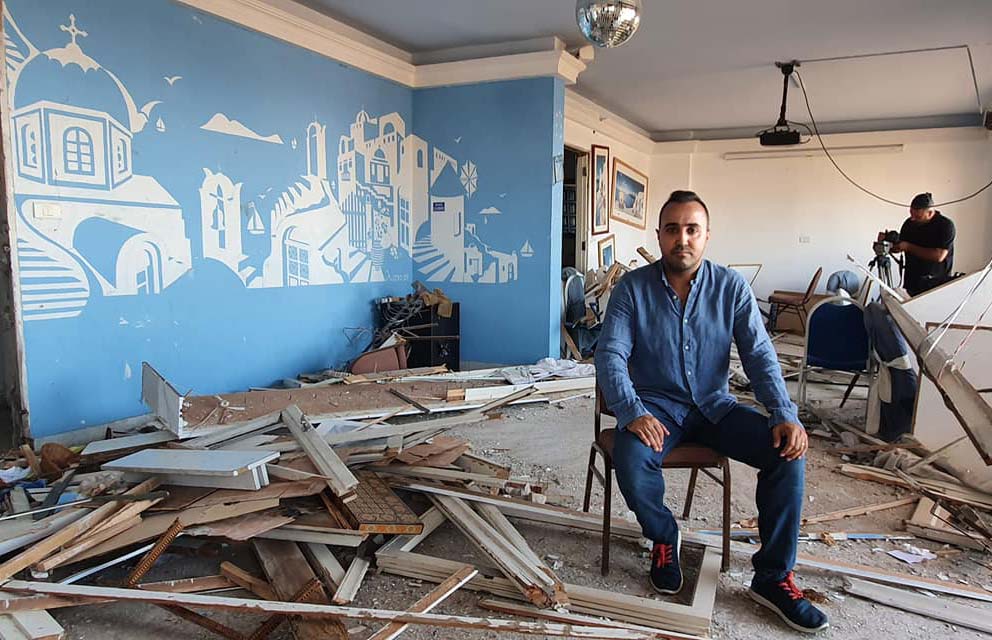In a film shot shortly after the explosion in Beirut’s port, one director reflects on the Hellenic community in the island’s neighbouring country. PAUL LAMBIS meets him
It was shortly after 6pm on August 4, 2020, when one of the largest non-nuclear explosions tore through the streets of Beirut. The force of the shockwaves swept through homes and shops with thousands of lives upended as the Lebanese capital transformed into a hellscape.
Two years after the port explosion, the tragedy has put much on hold since neighbourhoods are still scarred by its effects. Politicians seem to have swept the explosion under the rug, while activists continue to demand justice for their deceased relatives.
Two weeks after the explosion, Lebanese-Greek journalist and filmmaker George Eid began shooting his award-winning documentary Zeibekiko in Beirut that would tell the story of the city’s diminishing Greek community, and the permanent damage to its Greek club. The poignant documentary includes the testimony of Greeks who reside in Beirut and provides a thorough explanation of the significance and spirit of the titular Greek folk dance zeibekeiko.
“My family came to Lebanon as refugees from Asia Minor, joining countless Greek, Armenian and Assyrian refugees who were escaping persecution from the Ottoman Turks at the turn of the 20th century,” Eid said. “They settled and prospered in Lebanon, yet they never lost touch with their Greek roots or culture.
“We had this beautiful Greek club, which was close to the port where the explosion occurred.”
According to Eid, the venue had long been a popular meeting place for the once-thriving Greek community in Lebanon. “It was a social venue where we frequently gathered for festivals, dances, cultural events, and meals, and would also serve as a Greek learning centre, offering classes in Greek language and culture.
“The first place I visited shortly after the explosion was the Greek club, and I was startled to see a member of my community coming out of the wreckage,” Eid told Living. “I felt obligated to document the entire incident on camera and to show how the explosion affected the club, which had served as a long-standing symbol for the previous generations who had tried to forge an identity in a foreign country.”
George Eid was born in Beirut and raised during a period of civil conflict in Lebanon. His love of learning languages began at a young age, and he eventually acquired the ability to speak Arabic, German, French, English and Greek.
After graduating from the Notre Dame University with a BA in journalism and public relations, Eid furthered his studies with a master’s degree in marketing, management, communication and media.

Reporting on the Beirut port explosion
As a journalist, Eid frequently came under attack for delivering objective news. He was constantly under the radar, receiving threats to his life, and was even shot at while reporting on Hezbollah militants in western Beirut in 2011.
Despite the difficulties faced by investigative journalism, Eid remained committed to preserving and promoting his Greek cultural identity in his hometown Beirut. He supported various initiatives, such as the establishment of the first Greek Festival of Lebanon, which drew over 12,000 people.
However, his debut as a filmmaker was in 2016 when he produced the documentary Kalimera Men Beirut, a short film chronicling the tale of the Greek refugees who fled to Lebanon in 1922.
“It is unfortunate, especially in today’s world when immigration issues are prominent, that the majority of Greeks in Lebanon continue to uphold their Greek cultural heritage, yet they do not have Greek citizenship and have not been recognised by Greece.
“Greece and other European nations are currently making great efforts to assist refugees, however I would be happy if they started with their own communities within the diaspora, such as those who were almost wiped out by the Ottomans. These people are the remnants of what was once a very prosperous Greek community in Asia Minor,” he added.
Zeibekiko in Beirut’s iconic opening scene features a lone dancer – a member of Lebanon’s dwindling Greek community – dressed in black, expressing his grief against a background of destruction, as the haunting, melancholic sounds of the bouzouki reflect the broken dreams, shattered relationships, and feelings of loss of the community.
“As I was interviewing various members of the Greek community for the documentary, I could hear the disturbing sounds of ambulance sirens in the distance searching for bodies buried under the rubble,” Eid said.
He claims that his love of the zeibekiko and the painful realisation that he would never be able to dance at the Greek club again served as the inspiration for the movie’s title. His bittersweet film was a farewell gift to Lebanon, a country he felt no longer represented him or could protect him and his family.
Today, George Eid is the editor in chief of the news at Al Mashad TV, a Dubai-based, independent multi-platform news channel, which will be launched in the coming months.
Regardless of where he resides, George is committed to bridging the gap between the Greek diaspora, which is dispersed throughout many countries.
“There was a time when Greece was all over the world, from Afghanistan to the Americas, and it left traces everywhere. Together with the Greek community in Dubai, we are working on a new project, which will be announced soon, that will undoubtedly deepen the bonds between our global Hellenic family.”
Zeibekiko in Beirut was selected for screenings at eight international film festivals in Canada, Turkey, Greece and Cyprus among others.
Watch Zeibekiko in Beirut online: https://bit.ly/3QsGdaz
Watch Kalimera from Beirut online: https://bit.ly/3zTjc9u
Watch the interview with George Eid on Culturescope: https://bit.ly/3Qsdym4







Click here to change your cookie preferences